Muhlenberg Announces Faculty Promotions
Eleven members of the faculty were recently granted tenure and promoted to associate professor by the Board of Trustees on the recommendation of President Kathleen Harring.Monday, February 28, 2022 03:07 PM
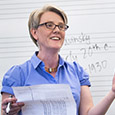 Kassandra Hartford, Associate Professor of Music
Kassandra Hartford, Associate Professor of Music
In her teaching, Hartford provides students the tools to investigate both how music works, its structural organization into formal patterns, and the cultural work music does, not only reflecting its historical circumstances but also more actively shaping them. Students learn to listen attentively—an invaluable skill not only for music majors but for all liberal arts students—and consider how listening practices are historically, socially, and culturally embedded.
Primarily a scholar of 20th century American, French and Brazilian music, Hartford examines the influence of transnational exchanges on musical works and music’s role in shaping conceptions of racial and national identity in the era between the two World Wars. More broadly, her scholarship examines power relations in music, a thread that connects her book project, Sounding Nation, Hearing Race, to her publications on feminist opera pedagogy and Black composer and veteran Lt. James Reese Europe’s sonic representations of his experience in World War I.
Hartford earned her B.A. from Mount Holyoke and M.A. and Ph.D. from Stony Brook University.
 Frederick Wright Jones, Associate Professor of Art
Frederick Wright Jones, Associate Professor of Art
Jones’s goal in the classroom is to provide students with an opportunity to define their artistic direction, take risks and learn from failure. In both the studio and classroom, he weaves together myths, history, contemporary politics and pop culture and provides students with tools for manipulating form and body. Students take from their experiences—whether background, interests or identity—different ways of tackling notions of maker, object and audience.
Jones’s multimedia sculptures materialize an effort to define and redefine his placement as an American and global citizen. Growing up African American of mixed heritage in rural Pennsylvania and living as a foreigner in Europe and with an ethical compass that hovers between dutiful responsibility and post-punk cynicism, he allows folk art to inspire him; relentlessly appropriating tools of the artist unknown, the vanquished, merchandising, underground comics, pop idols and populist propaganda.
Jones earned his B.A. from the University of Pennsylvania and M.F.A. from University at Buffalo, the State University of New York (SUNY).
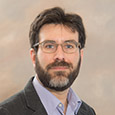 Daniel Leisawitz, Associate Professor of Languages, Literatures and Cultures (Italian Studies)
Daniel Leisawitz, Associate Professor of Languages, Literatures and Cultures (Italian Studies)
The study of Italian language, literature, art and culture constitutes the foundation of the interdisciplinary Italian Studies Program, which Leisawitz founded in 2015 and currently directs. Leisawitz’s Italian language courses are based on "Spunti", an online curriculum that he authored together with his colleague in Italian, Daniela Viale, specifically for Muhlenberg students, but which is available as an Open Educational Resource for free on the internet for any instructors who wish to use it. Leisawitz uses an interactive, communicative approach to language teaching that has students speaking Italian from the first day of class. He also teaches a growing roster of advanced courses on Italian literature, art and culture, including Italian Theatre in Translation, Jewish-Italian Literature & Culture and Italian Cities in Italian Cinema.
Leisawitz’s areas of scholarly research include Italian cinema, Italian Renaissance literature, Italian 20th-century literature and Jewish-Italian culture. In addition to his traditional print scholarship, Leisawitz collaborates with student researchers on his digital humanities project, “The Orlando Furioso Atlas”, a cartographic exploration and analysis of the 16th-century epic romance, the Orlando Furioso. This interactive atlas allows students and scholars to investigate this fundamental Renaissance text in innovative ways.
He earned his B.A. from Lafayette College, M.A. from the University of Pennsylvania and Ph.D. from Yale University.
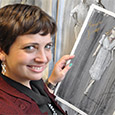 Rebecca Lustig, Associate Professor of Theatre & Dance (Theatre)
Rebecca Lustig, Associate Professor of Theatre & Dance (Theatre)
Lustig’s studio classes encourage students to explore their own theatre-making processes and discover how design elements can support and contribute to storytelling in performance. In her design classes, students learn to interpret a performance text and develop a design from concept to presentation. Lustig also teaches about the history of costume and fashion, focusing on the use of historical research for performance design and the interpretation of period-inspired garments in performance.
As a costume designer, Lustig’s work has appeared across the U.S. and was featured in the United States Exhibit at the 2015 Prague Quadrennial. She especially enjoys designing new and company devised works, such as the ongoing project “Flight” with the New York-based Anonymous Ensemble. She also regularly designs musicals, including for Muhlenberg’s Summer Music Theatre. Lustig was the assistant costume designer on the North American productions of Billy Elliot the Musical (Broadway and national tours) and assistant/associate designer on the Hal Prince directed productions LoveMusik on Broadway, Paradise Found in London and Candide at the New York City Opera.
Lustig earned her B.A. in Theater from the University of California, Santa Cruz and her M.F.A. in Costume Design from the University of California, San Diego.
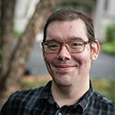 Kenneth Michniewicz, Associate Professor of Psychology
Kenneth Michniewicz, Associate Professor of Psychology
Teaching throughout the psychology curriculum, Michniewicz’s main teaching interests focus on a better understanding of how status and inequality can result in our judgments of other individuals and groups, particularly with a focus on gender and sexual identities as representations of inequality.
His research interests are varied but focus on this theme of status and inequality. One line of research focuses on the psychology of underdogs (individuals, groups or entities at a competitive disadvantage in some context). A second line of work focuses on the way that people's pet dogs help form our impressions of pet owners. He is also exploring psychological mechanisms that cause reluctance in accepting a 'feminist' identity.
Michniewicz earned his B.S. from the University of Central Florida and M.A. and Ph.D. from the University of South Florida.
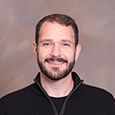 Matthew Moore, Associate Professor of Theatre & Dance (Theatre)
Matthew Moore, Associate Professor of Theatre & Dance (Theatre)
In his courses, Moore asks students to think about the impact theatrical practice can and does have on ways of thinking and behaving as a society—from the processes we engage to make theatre to the bodies and voices that appear on our stages—every act of representation helps to form, not just reflect, a world. He tries to cultivate the critical and creative tools necessary for students to make intentional and ethical choices as to how their artistic practice will contribute to our evolving reality.
Moore studies Greek, Irish and avant-garde theatre, but much of his recent scholarship focuses on the relationship between theatre and ecological ways of thinking—asking how theatre participates in the overlapping and mutually generative systems of human subjectivity, sociality and the total environment. Creatively, his research is focused on group devising processes, site-specific and immersive theatre. In his production work and studio courses, Moore strives to facilitate humane, ethical and empowering models of creation that open opportunities for social change.
He earned his B.A. from Muhlenberg College and Ph.D. from Stanford University.
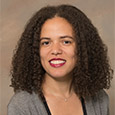 Elena FitzPatrick Sifford, Associate Professor of Art History
Elena FitzPatrick Sifford, Associate Professor of Art History
Sifford’s courses include the art history survey as well as courses in the Early Modern period (c. 1500-1800) from a global perspective. This includes courses on the Colonial Americas, Renaissance & Baroque Art and Architecture in Europe, and Pre-Columbian Art. She is also an affiliate faculty member with Africana studies, Latin American & Caribbean studies and Italian studies.
Her most recent work investigates the depiction of Africans in the visual culture of colonial Mexico and Peru. “Mexican Manuscripts and the First Images of Africans in the Americas” was published in Ethnohistory (Duke University Press, 2019), and “A Fly in Milk: Fear and Black (In)visibility in New Spanish Painting,” was published in Emotions, Art, and Religion in Europe, Africa, and the Americas, c. 1400-1800 (Brill). She has also recently worked with a colleague at Cornell University, Ananda Cohen-Aponte, on several projects addressing issues of diversity and inclusion in the field of art history. They conducted a survey in order to analyze data regarding faculty of color in the professoriate and address ways of widening the pathway in order to diversify the field of Latin American art history.
Sifford earned her B.A. in Art History and African American Studies from Oberlin College and Ph.D. in Art History from The City University of New York.
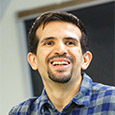 Jorge Silveyra, Associate Professor of Computer Science
Jorge Silveyra, Associate Professor of Computer Science
Teaching a wide range of computer science classes, Silveyra enjoys introducing his students to new and challenging topics in the field. He’s also interested in creating courses that can help non-computer scientists learn computer science concepts in a friendly and useful way. His goals include helping them become proficient in abstraction techniques and develop problem solving skills that can be applied to solve all sorts of computational and non-computational problems.
Silveyra’s research predominantly involves computational epidemiology, modeling and simulation; and computational immunology. These are multidisciplinary fields that use computer science, mathematics, public health, chemistry and biochemistry. Specifically, he’s interested in investigating how much diseases are affected by a person’s physiology versus by their social and behavioral characteristics. His latest research looks at using natural language processing (computers that read human language) and machine learning (computers that act rationally without being explicitly programmed to do so) to address issues related to epidemiology and political science. These types of programs look for patterns, such as propaganda, in text that might not be obvious to humans reading text.
Silveyra earned his B.A. at the Universidad Autónoma del Estado de México and his M.S. and Ph.D. from the University of North Texas.
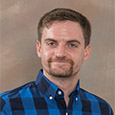 James Russell, Associate Professor of Mathematics & Computer Science (Mathematics)
James Russell, Associate Professor of Mathematics & Computer Science (Mathematics)
In teaching statistics, Russell believes it is important to focus on both the mathematical foundations of statistical theory and the real-world applicability of statistical analysis. In his classes, he works to incorporate real-world examples, to expose students to real data sets through hands-on experience using technology and modern statistical software and to collaborate with others on analytical projects.
Russell’s research focuses on projects that involve developing novel statistical tools to model complex real-world systems and he’s particularly interested in Bayesian modeling and spatial statistics. His work on modeling animal movement is useful for understanding how animals interact with each other and the environment and can help prevent the spread of disease. Other recent work includes predicting voter turnout, using tools from spatial statistics to measure gerrymandering, predicting outcomes for fourth-down decisions in football, assessing technology use in the classroom, determining the relationship between legislation and employment for individuals with disabilities, studying tick-borne pathogens in the Lehigh Valley and understanding radon awareness in local communities.
Russell earned his B.A. from the College of the Holy Cross and Ph.D. at Pennsylvania State University.
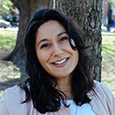 Sahar Sadeghi, Associate Professor of Sociology
Sahar Sadeghi, Associate Professor of Sociology
Sadeghi teaches a variety of courses including the sociology of inequality and power, American ethnic diversity, transnational migrant communities, global perspectives on race and racism as well as sociological theory.
Her research is organized around several interrelated projects and themes—migration and geopolitics, as well as racialized and politicized belonging—which are examined through a cross-national, qualitative methods approach with a regional specialization in contemporary Europe and the United States. In her most recent work, Sadeghi considers how the rise of anti-immigrant movements across Europe, the 2015 Refugee Crisis, the 2016 Iran Deal, the most recent US Presidential Election and the 2017 “Muslim Ban” are reflected in the perceptions and experiences of belonging and membership of Iranians in the US and Germany.
Sadeghi earned her B.A. from the University of California, Davis and M.A. and Ph.D. from Temple University.
 Randall Smith, Associate Professor of Theatre & Dance (Dance)
Randall Smith, Associate Professor of Theatre & Dance (Dance)
Smith’s passions as an educator integrate multiple domains of being, doing and practice simultaneously. As an educator-mentor, Smith believes in empowering learning as it is the focal point of his work, research and development. Smith teaches contemporary dance technique with an emphasis on Black vernacular, choreography and composition, Intergroup Dialogue and other dance theory and practice courses.
Smith’s research focuses on the “muse-relationship”: how the creative and interpersonal dynamic between choreographers and dancer performers is established, maintained and bolstered. This work translates into Smith’s teaching, showing dancers and non-dancers alike how to understand their creative potential, thus generating tools to maximize efforts while being in states of flow and high creative output. Showing learners, from artists to scientists to business people, how dialogue with the self extends to conversations with others, ultimately helps them to find their niche stimulating collaboration, advocacy and change-making habits.
Among other accomplishments, Smith was a dancer of Armitage Gone! Dance and Amanda Selwyn Dance Theatre, both in New York City; served as a répétiteur and assistant to legendary choreographer Donald McKayle (1930-2018); performed with McKayle’s Etude Ensemble for four years; and maintained a practice of performing, restaging and interpreting McKayle’s repertory, while creating dance works and teaching dance nationally.
Smith earned a B.F.A. in Dance Performance, B.F.A. in Dance Choreography and an M.F.A. from the University of California, Irvine.
About Muhlenberg College
Founded in 1848, Muhlenberg is a highly selective, private liberal arts college offering baccalaureate and graduate programs. With an enrollment of nearly 2,000 students, Muhlenberg College is dedicated to shaping creative, compassionate, collaborative leaders through rigorous academic programs in the arts, humanities, natural sciences and social sciences; selected preprofessional programs, including accounting, business, education and public health; and progressive workforce-focused post-baccalaureate certificates and master’s degrees. Located in Allentown, Pennsylvania, approximately 90 miles west of New York City, Muhlenberg is a member of the Centennial Conference, competing in 23 varsity sports. Muhlenberg is affiliated with the Evangelical Lutheran Church in America.
